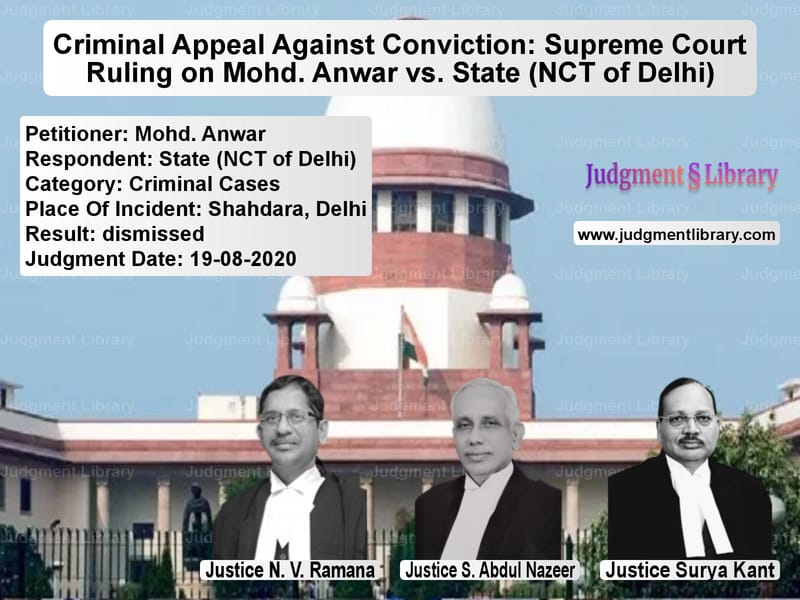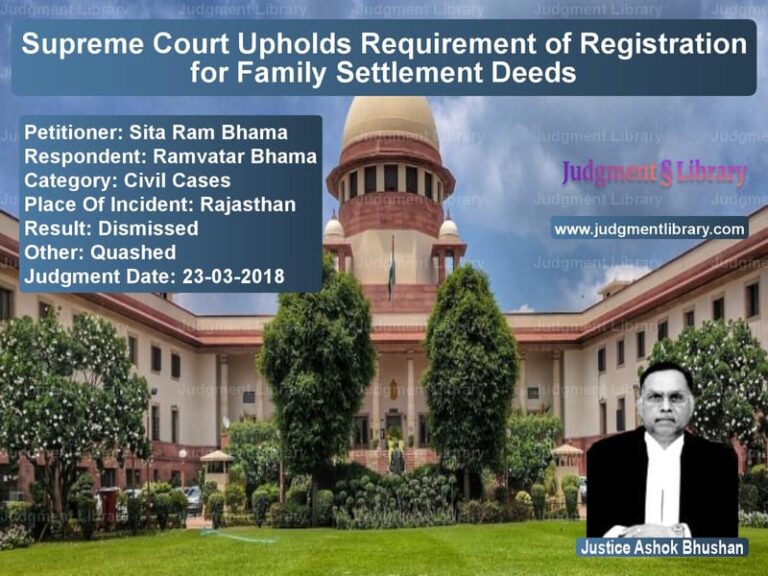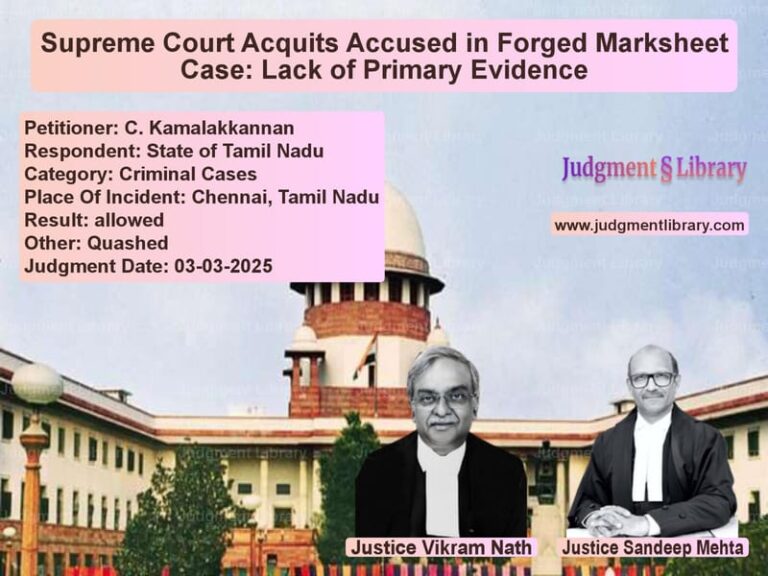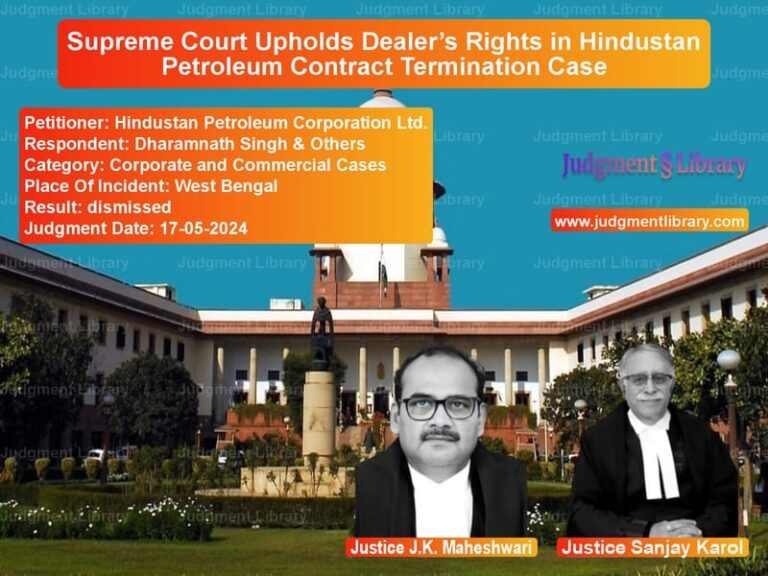Criminal Appeal Against Conviction: Supreme Court Ruling on Mohd. Anwar vs. State (NCT of Delhi)
The Supreme Court of India, in its judgment dated August 19, 2020, examined the criminal appeal of Mohd. Anwar, who challenged his conviction under Section 394 of the Indian Penal Code (IPC) and Section 25 of the Arms Act, 1959. The case revolved around a robbery that occurred in Delhi on May 17, 2001, where the complainant, Tabban Khan, was attacked by three assailants, including the appellant, and was robbed of Rs. 30,000.
The trial court convicted Anwar and sentenced him to seven years of rigorous imprisonment. The Delhi High Court reduced the sentence to two years. The Supreme Court reviewed the evidence and arguments presented and ultimately dismissed the appeal, upholding the High Court’s decision.
Background of the Case
The prosecution’s case was that on the night of May 17, 2001, the complainant stopped his motorcycle near Shahdara to relieve himself. Three men, including the appellant, attacked him with a knife and a revolver. They took Rs. 30,000 from him and attempted to kill him but fled when bystanders intervened.
The complainant reported the matter to the police the following evening. The police apprehended three suspects on May 20, 2001, after they were seen suspiciously deboarding a bus. A prohibited buttondar knife was recovered from them, and they confessed to committing the robbery.
Petitioner’s Arguments
The counsel for Mohd. Anwar argued that:
- The prosecution failed to prove his guilt beyond a reasonable doubt.
- There were no independent witnesses to corroborate the complainant’s version.
- The complainant did not sustain injuries despite claiming to have been attacked.
- There was an unexplained delay of three days in lodging the FIR, casting doubt on the prosecution’s version.
- The refusal to participate in the Test Identification Parade (TIP) was not an admission of guilt.
- The appellant was a minor at the time of the incident and was undergoing treatment for a mental disorder, making him ineligible for criminal liability.
Respondent’s Arguments (State of NCT of Delhi)
The prosecution, represented by the Additional Solicitor General, countered the claims by arguing that:
- The complainant’s testimony was consistent and corroborated by police witnesses.
- The three-day delay in filing the FIR was due to the victim’s traumatized state.
- The appellant’s refusal to participate in the TIP indicated a guilty conscience.
- The defense’s claims of juvenility and insanity were raised belatedly and lacked documentary proof.
- The High Court had already taken a lenient view by reducing the sentence from seven years to two years.
Supreme Court’s Observations
The Supreme Court carefully examined the evidence and legal contentions. Key observations included:
- The trial court’s finding that the complainant’s testimony was credible and consistent was upheld.
- The refusal to undergo TIP was found to be incriminating.
- The claim of juvenility was unsupported by any birth certificate, school records, or medical tests.
- The claim of mental illness was unsubstantiated and belied by the appellant’s ability to evade capture and participate in legal proceedings.
- The three-day delay in registering the FIR was not unusual given the circumstances.
Final Verdict
The Supreme Court ruled that:
- The conviction under Section 394 IPC and Section 25 of the Arms Act was upheld.
- The sentence of two years rigorous imprisonment imposed by the High Court was confirmed.
- The appellant’s bail was revoked, and he was directed to surrender.
Impact of the Judgment
This ruling has significant implications for criminal law:
- It reinforces that delay in lodging an FIR does not automatically render a case doubtful.
- It emphasizes that refusal to participate in TIP can be considered incriminating.
- It sets a precedent for evaluating claims of juvenility and insanity, requiring substantial evidence rather than mere assertions.
- It affirms the need for appellate courts to exercise caution when reviewing concurrent findings of guilt.
The Supreme Court’s ruling ensures that convictions based on strong evidence and credible testimonies are upheld while preventing abuse of procedural safeguards.
Petitioner Name: Mohd. Anwar.Respondent Name: State (NCT of Delhi).Judgment By: Justice N. V. Ramana, Justice S. Abdul Nazeer, Justice Surya Kant.Place Of Incident: Shahdara, Delhi.Judgment Date: 19-08-2020.
Don’t miss out on the full details! Download the complete judgment in PDF format below and gain valuable insights instantly!
Download Judgment: Mohd. Anwar vs State (NCT of Delhi) Supreme Court of India Judgment Dated 19-08-2020.pdf
Direct Downlaod Judgment: Direct downlaod this Judgment
See all petitions in Bail and Anticipatory Bail
See all petitions in Attempt to Murder Cases
See all petitions in Judgment by N.V. Ramana
See all petitions in Judgment by S. Abdul Nazeer
See all petitions in Judgment by Surya Kant
See all petitions in dismissed
See all petitions in supreme court of India judgments August 2020
See all petitions in 2020 judgments
See all posts in Criminal Cases Category
See all allowed petitions in Criminal Cases Category
See all Dismissed petitions in Criminal Cases Category
See all partially allowed petitions in Criminal Cases Category







